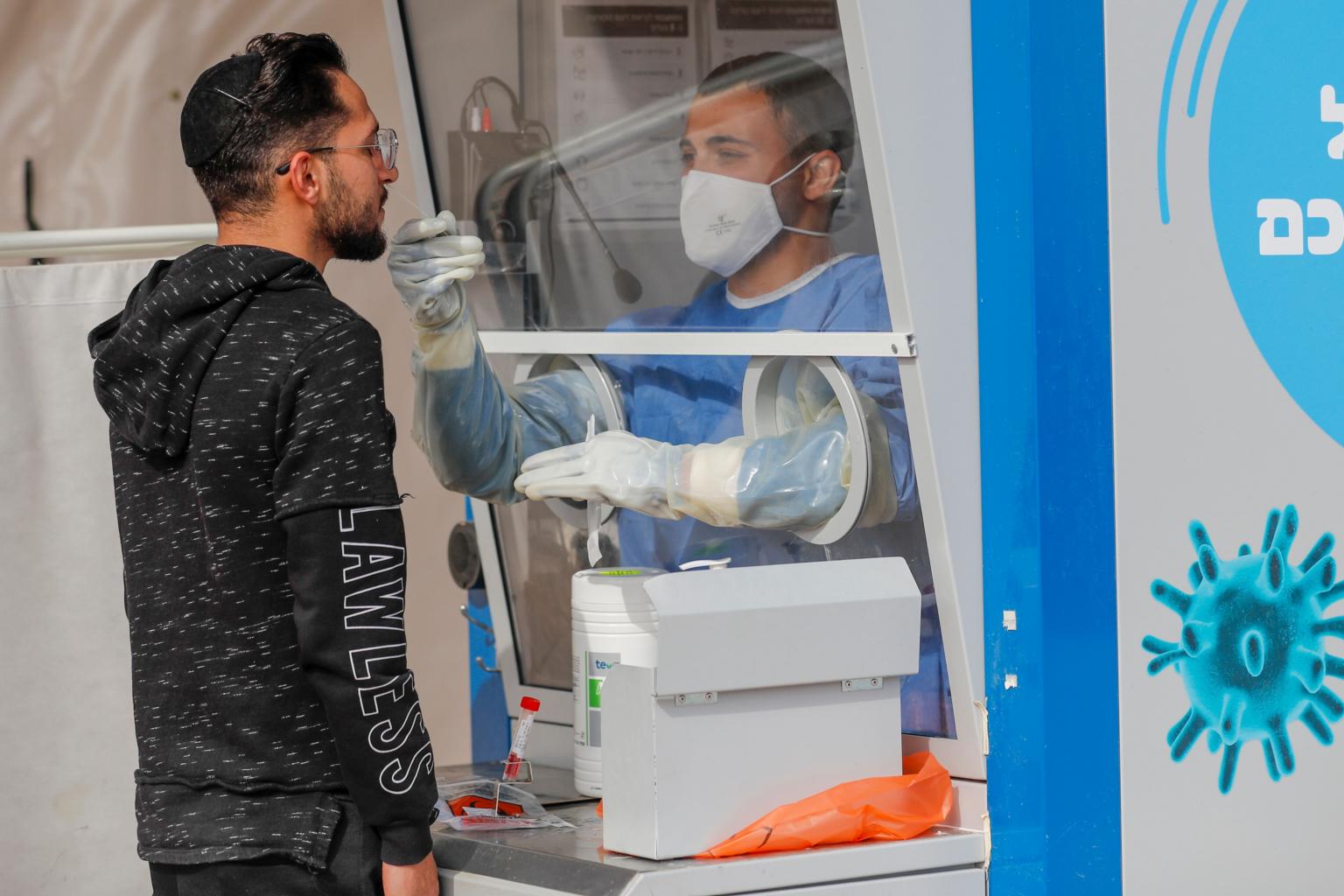After quick vaccine success, Israel faces new coronavirus woes
Sign up now: Get ST's newsletters delivered to your inbox

Israel faces a tightened lockdown, as infections have spiralled to more than 8,000 new cases a day.
PHOTO: AFP
Follow topic:
JERUSALEM (NYTIMES) - Just last week, Israel was seen as a model coronavirus country, outstripping the rest of the world in the pace of vaccinating its citizens by a hefty margin.
But the virus had other ideas.
This week, Israel faces a tightened lockdown, as infections have spiralled to more than 8,000 new cases a day, officials fear the more transmissible variant of the virus first identified in Britain is spreading rapidly, and Israel's vaccine supplies are running low.
The prospect that Israel would have the virus under control by spring, once promising, now seems uncertain. Health officials say that in the short term, at least, the vaccine campaign cannot compete with the soaring infection rates.
And the Palestinian Authority, which runs its own healthcare system in the occupied West Bank, has asked Israel for vaccines, prompting a debate over Israel's responsibility to the Palestinians at a time when Israel's vaccine supplies are dwindling.
"We are at the height of a global pandemic that is spreading at record speed with the British mutation," Prime Minister Benjamin Netanyahu said in a video statement late Tuesday (Jan 5), justifying the government's decision to impose a full national lockdown that will shutter most schools and all nonessential workplaces for at least two weeks.
"Every hour we delay, the quicker the virus is spreading, and it will exact a very heavy price," he added.
The lockdown decision came after Professor Eran Segal of the Weizmann Institute of Science in Rehovot, Israel, presented the government with the dire projection that without such action, Israel's infection rate could rise to 46,000 new cases per day by February, a staggering number in a country with a population of about 9 million.
Government officials cited the variant discovered in Britain as one of the main reasons for imposing the tighter restrictions. Mr Netanyahu said the variant was "leaping forward," though not at the same pace as it has spread in Britain.
At least 30 cases of the variant have been identified in Israel by special sampling, scattered across 14 different towns and cities, but officials and experts said those tests were aimed at identifying the presence of the variant, not quantifying it, and the actual number of cases was likely much higher.
Many scientists believe that the variant is more transmissible, meaning it may spread more easily from one person to another.
Prof Segal said the variant may be a factor in the soaring infection rate in Israel's ultra-Orthodox Jewish community. In the past four weeks, infections among the ultra-Orthodox have increased sixteenfold.
He estimated that the variant now accounts for about 20 per cent of the morbidity in ultra-Orthodox towns and neighbourhoods.
Just days ago, Israelis were celebrating the successful rollout of their vaccination campaign, which has outpaced the rest of the world. About 1.5 million Israeli citizens, or more than 16 per cent of the population, have received a first dose of the Pfizer-BioNTech vaccine since the inoculation program started Dec 20.
The shortage, officials say, may be a result of the programme's success: the programme's first phase went faster than most thought possible.
Israel has not disclosed the number of vaccine doses that it has received, saying the agreements with the drug companies are confidential. The government has promised to reserve enough vaccines so that all those who received a first dose can receive their second dose as planned after about 21 days. That should include the majority of Israel's high-risk population of health workers and citizens ages 60 and older.
Quiet negotiations are being held with the drug companies to move up their deliveries, but the shortage could cause delays in the rollout. Mr Netanyahu, whose political future might depend on the success of the programme, said he was "continuing to work around the clock to bring millions of vaccines to Israel."
Mr Netanyahu said Wednesday that a small first shipment of Moderna vaccines was to arrive Thursday and that more were forthcoming. Drug companies now see Israel as an interesting test case for the efficacy of the vaccinations and, potentially, as the first country to be fully vaccinated, officials and experts said, giving it an edge in securing additional shipments.
Israel has faced criticism from human rights groups for not extending its vaccine programme to most Palestinians living under Israeli control even as Israelis living in West Bank settlements were being vaccinated.
Palestinian officials have recorded hundreds of Covid-19 cases a day in the occupied West Bank and in the Hamas-run Gaza Strip, the crowded Palestinian coastal enclave whose borders are tightly controlled by Israel and Egypt, and health officials believe the true numbers are much higher. Palestinians in those areas have yet to receive vaccines.
The Oslo Accords, the interim peace agreements signed in the 1990s between Israel and the Palestine Liberation Organisation, commit the two sides to cooperate in combating epidemics and to assist each other in times of emergency.
Israel's health minister Yuli Edelstein said last week that it was in Israel's interest to contain the virus on the Palestinian side but that Israel's first obligation was toward its own citizens. (Palestinian citizens of Israel and residents of East Jerusalem are receiving vaccinations through the Israeli programme.)
Dr Ali Abed Rabbo, a senior official in the authority's Health Ministry, said that the Palestinians hope to receive 2 million doses of the Oxford-AstraZeneca vaccine in February. They also expect the global vaccine-sharing system Covax to deliver 60,000 doses in the first quarter of 2021 and nearly 2 million more during the rest of the year.

